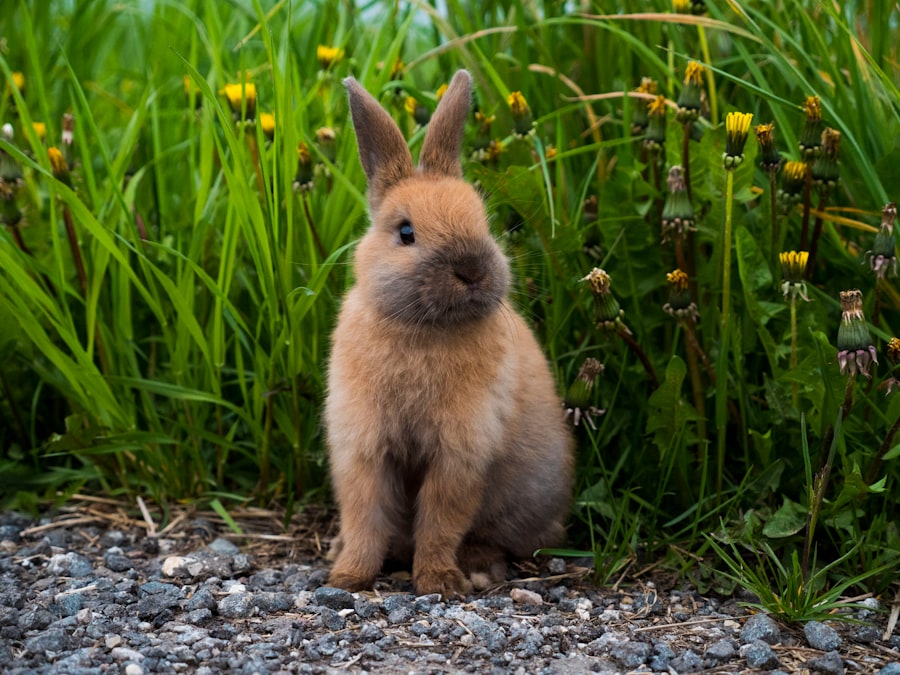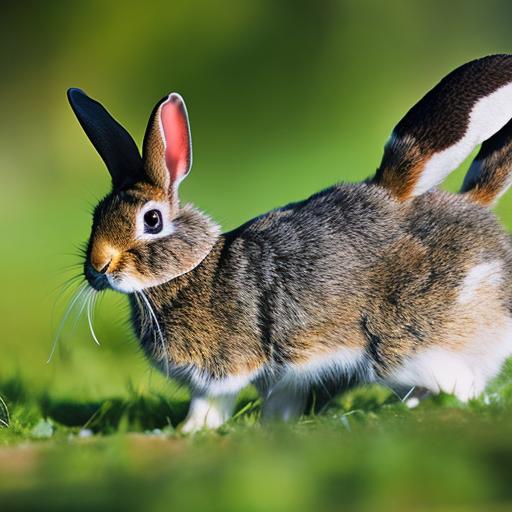Keeping rabbits and chickens together may seem like an unusual combination, but it can actually be a beneficial arrangement for both animals. Rabbits and chickens have different needs and behaviors, but with proper planning and care, they can coexist in harmony. This article will explore the benefits of keeping rabbits and chickens together, as well as the factors to consider before introducing them. We will also discuss how to prepare the chicken coop for rabbits, design a coop plan that accommodates both animals, and provide adequate food, water, and living conditions for both rabbits and chickens.
Key Takeaways
- Rabbits and chickens can be compatible and beneficial to keep together.
- Factors such as temperament, size, and gender should be considered before introducing rabbits to a chicken coop.
- Preparing the chicken coop for rabbits involves creating separate spaces and providing adequate food and water for both animals.
- Designing a chicken coop plan that accommodates rabbits can include adding ramps, shelves, and hiding spots.
- Monitoring the relationship between rabbits and chickens is important to ensure a safe and happy environment for both animals.
The Benefits of Keeping Rabbits and Chickens Together
One of the main benefits of keeping rabbits and chickens together is pest control. Rabbits are natural grazers and can help keep the grass and weeds in check, while chickens are excellent at controlling insects and pests. By combining these two animals, you can create a natural pest control system that reduces the need for chemical pesticides.
Another benefit is manure management. Both rabbits and chickens produce manure that can be used as fertilizer for your garden or crops. By keeping them together, you can easily collect their manure in one place and use it to enrich your soil. This not only saves you money on commercial fertilizers but also reduces waste.
Keeping rabbits and chickens together also saves space and resources. Instead of having separate enclosures for each animal, you can house them together in a shared space. This not only saves space in your backyard but also reduces the amount of materials needed to build separate enclosures.
Factors to Consider Before Keeping Rabbits with Chickens
Before introducing rabbits to a chicken coop, it is important to consider the temperament and behavior of both animals. Chickens are generally social animals that live in flocks, while rabbits are more solitary creatures. Some rabbits may become stressed or anxious when housed with chickens, so it is important to monitor their behavior and provide them with a safe and comfortable environment.
Another factor to consider is the potential health risks. Chickens can carry diseases such as coccidiosis, which can be harmful to rabbits. It is important to consult with a veterinarian and take necessary precautions to prevent the spread of diseases. This may include regular health checks, vaccinations, and proper hygiene practices.
Preparing the Chicken Coop for Rabbits
Before introducing rabbits to a chicken coop, it is important to prepare the coop to ensure the safety and comfort of both animals. One of the key considerations is proper ventilation. Rabbits are sensitive to heat and humidity, so it is important to provide adequate airflow in the coop. This can be achieved by installing windows or vents that can be opened or closed as needed.
Lighting is another important factor to consider. Both rabbits and chickens require natural light for their well-being. Make sure the coop has windows or skylights that allow natural light to enter. If natural light is not sufficient, you may need to install artificial lighting.
Insulation is also important, especially in colder climates. Make sure the coop is well-insulated to protect both rabbits and chickens from extreme temperatures. This can be achieved by using insulation materials such as foam boards or straw bales.
Designing a Chicken Coop Plan that Accommodates Rabbits
When designing a chicken coop plan that accommodates rabbits, it is important to consider the specific needs of both animals. One of the key considerations is space. Rabbits require more space than chickens, so make sure the coop is large enough to accommodate both animals comfortably.
It is also important to provide separate spaces for each animal. Rabbits need a quiet and secluded area where they can retreat and feel safe. This can be achieved by creating separate nesting boxes or hutches for rabbits within the coop.
Chickens, on the other hand, need roosting bars and nesting boxes. Make sure there are enough roosting bars for all the chickens and provide sufficient nesting boxes for them to lay their eggs.
Creating Separate Spaces for Rabbits and Chickens in the Coop

Creating separate spaces for rabbits and chickens within the coop is essential to ensure their safety and well-being. This can be achieved by using dividers or partitions to create separate areas for each animal.
For rabbits, provide separate nesting boxes or hutches where they can retreat and feel safe. These should be elevated off the ground to prevent drafts and provide insulation. Make sure the nesting boxes are large enough for the rabbits to comfortably move around and have proper bedding.
For chickens, provide separate roosting bars and nesting boxes. Roosting bars should be placed at different heights to accommodate different sizes of chickens. Nesting boxes should be easily accessible and provide privacy for the hens to lay their eggs.
Providing Adequate Food and Water for Both Rabbits and Chickens
Providing adequate food and water for both rabbits and chickens is crucial for their health and well-being. It is important to provide separate feeding and watering areas to prevent competition and ensure that each animal gets the necessary nutrients.
For rabbits, provide a constant supply of fresh hay, as well as fresh vegetables and fruits. Make sure they have access to clean water at all times. It is also important to provide a salt lick or mineral block to ensure they get all the necessary minerals.
For chickens, provide a balanced diet of commercial chicken feed, as well as fresh fruits, vegetables, and grains. Make sure they have access to clean water at all times. It is also important to provide oyster shells or crushed eggshells to ensure they get enough calcium for egg production.
Ensuring Safe and Comfortable Living Conditions for Rabbits and Chickens
Ensuring safe and comfortable living conditions for both rabbits and chickens is essential for their well-being. One of the key considerations is bedding. Rabbits need a soft and absorbent bedding material, such as straw or wood shavings. Make sure to clean the bedding regularly to prevent the buildup of waste and odors.
Chickens, on the other hand, need a dry and clean environment. Use materials such as straw or wood shavings for their bedding. Make sure to clean the coop regularly to prevent the buildup of waste and parasites.
Temperature control is also important. Rabbits are sensitive to heat and humidity, so make sure the coop is well-ventilated and shaded during hot weather. Chickens are more tolerant of heat but can suffer from frostbite in cold weather. Make sure the coop is well-insulated and provide heat lamps or heaters if necessary.
Predator-proofing is another important consideration. Both rabbits and chickens are vulnerable to predators such as foxes, raccoons, and birds of prey. Make sure the coop is secure and has proper fencing or netting to prevent predators from entering.
Monitoring the Relationship between Rabbits and Chickens
Monitoring the relationship between rabbits and chickens is important to ensure their safety and well-being. While some rabbits and chickens may get along well, others may not. It is important to observe their behavior and intervene if any aggression or bullying occurs.
If you notice any signs of aggression, such as chasing, pecking, or biting, it may be necessary to separate the animals temporarily. Provide separate spaces for each animal until they can coexist peacefully. You may also need to consult with a veterinarian or animal behaviorist for further guidance.
Enjoying the Benefits of Keeping Rabbits and Chickens Together in a Safe and Happy Environment
In conclusion, keeping rabbits and chickens together can be a beneficial arrangement for both animals. By combining their natural behaviors and needs, you can create a natural pest control system, manage manure effectively, and save space and resources. However, it is important to consider the temperament and behavior of both animals, as well as the potential health risks. By preparing the chicken coop for rabbits, designing a coop plan that accommodates both animals, providing adequate food and water, ensuring safe and comfortable living conditions, and monitoring their relationship, you can enjoy the benefits of keeping rabbits and chickens together in a safe and happy environment.
If you’re considering keeping rabbits and chickens together, you may also be interested in learning about the ideal number of chickens for a family of four. Poultry Wizard has a helpful article that explores this topic in detail. Understanding the appropriate chicken-to-family ratio can ensure that you have enough eggs to meet your family’s needs while maintaining a manageable flock size. To read more about it, check out their article on how many chickens you need for a family of 4.
FAQs
Can I keep my rabbit with my chickens?
Yes, it is possible to keep rabbits and chickens together, but it requires careful planning and management to ensure the safety and well-being of both animals.
What are the benefits of keeping rabbits and chickens together?
Keeping rabbits and chickens together can provide several benefits, such as reducing the risk of predators, improving soil quality, and providing a more diverse and sustainable source of food.
What are the risks of keeping rabbits and chickens together?
The main risk of keeping rabbits and chickens together is the potential for aggression and injury between the animals. Rabbits can also carry diseases that can be harmful to chickens, and vice versa.
How can I ensure the safety of my rabbits and chickens?
To ensure the safety of your rabbits and chickens, it is important to provide separate living areas for each species, with secure fencing and housing. You should also monitor the animals closely for signs of aggression or illness, and provide appropriate nutrition and veterinary care.
What should I feed my rabbits and chickens?
Rabbits and chickens have different nutritional needs, so it is important to provide them with separate diets. Rabbits require a diet high in fiber, such as hay and fresh vegetables, while chickens require a diet high in protein, such as grains and insects.
Can rabbits and chickens share the same living space?
No, rabbits and chickens should not share the same living space. Rabbits require a dry, warm, and quiet environment, while chickens require a well-ventilated and open space.
Meet Walter, the feathered-friend fanatic of Florida! Nestled in the sunshine state, Walter struts through life with his feathered companions, clucking his way to happiness. With a coop that’s fancier than a five-star hotel, he’s the Don Juan of the chicken world. When he’s not teaching his hens to do the cha-cha, you’ll find him in a heated debate with his prized rooster, Sir Clucks-a-Lot. Walter’s poultry passion is no yolk; he’s the sunny-side-up guy you never knew you needed in your flock of friends!







